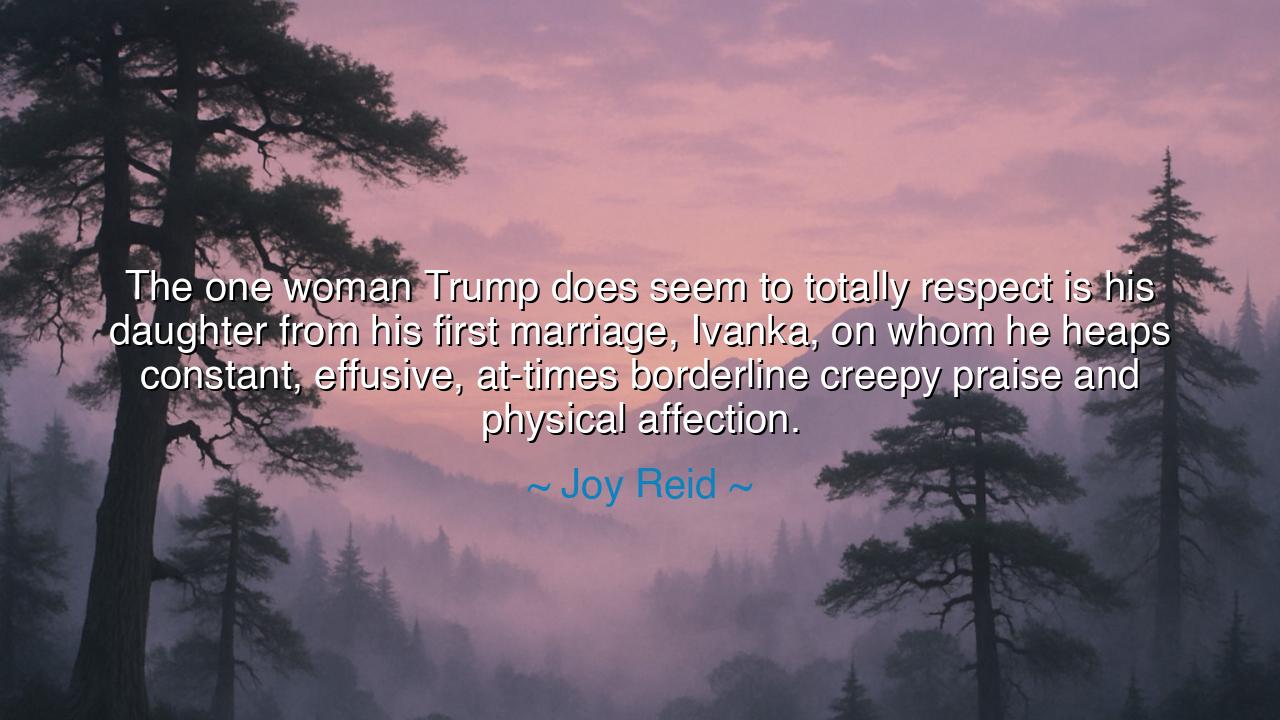
The one woman Trump does seem to totally respect is his daughter
The one woman Trump does seem to totally respect is his daughter from his first marriage, Ivanka, on whom he heaps constant, effusive, at-times borderline creepy praise and physical affection.






In the chronicles of modern speech, Joy Reid once uttered words that ripple with unease and introspection: “The one woman Trump does seem to totally respect is his daughter from his first marriage, Ivanka, on whom he heaps constant, effusive, at-times borderline creepy praise and physical affection.” It is a statement heavy with observation, layered with irony, and steeped in the sorrow of a society struggling to understand the boundaries between admiration and obsession, respect and possession, affection and display. Her words, though rooted in the politics of her time, reach beyond one man or one family; they expose the eternal frailty of power when it forgets the sacred humility that must guide all relationships, even those bound by blood.
The meaning of the quote lies not merely in its surface criticism but in its warning: when admiration becomes performative, when affection becomes a mirror for vanity rather than love, the purity of relationship decays. Joy Reid points to a father’s praise that crosses the quiet threshold of sincerity, entering instead the realm of spectacle—a love that seems less about the child and more about the self. This is a mirror held up to the world’s great and powerful, reminding them that when they love, they must do so with reverence, not display. To “heap constant, effusive praise” is not in itself wrong, but when it seeks applause, it ceases to be affection and becomes self-worship disguised as sentiment.
In the ancient courts of Rome, the Emperor Nero was known to drape his mother Agrippina in excessive praise, publicly proclaiming her divine while privately resenting her control. In his confused adoration and rebellion, the sacred bond between mother and son turned poisonous. Eventually, his affection decayed into cruelty, and he ordered her death. Thus the ancients learned: when love and power mingle without restraint, admiration turns to madness. Joy Reid’s words carry that echo—the warning that unchecked praise can hide unhealthy attachment or the corruption of familial respect by public ego.
At a deeper level, Reid’s observation mourns something broader—the loss of genuine respect for women in the halls of influence. When the only woman who receives admiration is one who reflects a man’s image or lineage, the rest are reduced to silence. It is a symbolic imbalance: woman is not seen as her own being, but as an extension of a man’s pride. In this light, the quote becomes more than commentary on Trump; it becomes a parable of how societies often mistake ownership for honor, and charm for care. When men praise women only to glorify themselves, they rob both love and dignity of their true meaning.
But even amid this critique, there is a call for awareness, not condemnation. For affection, rightly tempered, is sacred. A father’s pride in his daughter should be a reflection of her virtue and strength, not a theater for his emotions. The ancients taught moderation in all things—not the cold restraint of indifference, but the balance between passion and purity. The philosopher Seneca once said, “He who loves without wisdom harms what he loves.” Thus, even the warmest heart must learn self-restraint, lest its flame scorch rather than sustain.
If we look beyond the political and personal, Joy Reid’s words summon a greater truth: in a world of spectacle, sincerity is rebellion. Public affection has become currency; attention, the altar. To reclaim dignity, both men and women must learn to love quietly, to respect deeply, and to act with humility that does not seek an audience. The virtue lies not in how loudly one praises, but in how faithfully one honors.
Therefore, let the reader take this lesson to heart: respect must be rooted in reverence, not performance. Love must be pure enough to elevate the beloved, not use them as ornament or reflection. In family, in power, in all human ties—let affection be sacred, and restraint be its guardian. Speak your love truthfully, but let it be free of vanity. For the truest praise is not shouted before the world—it is whispered in the heart, and proven in action.
So remember, O seeker of wisdom: admiration without understanding becomes idolatry; affection without boundary becomes confusion. But love guided by humility and respect becomes eternal. Let this be the measure by which we love—and the measure by which we are remembered.






AAdministratorAdministrator
Welcome, honored guests. Please leave a comment, we will respond soon